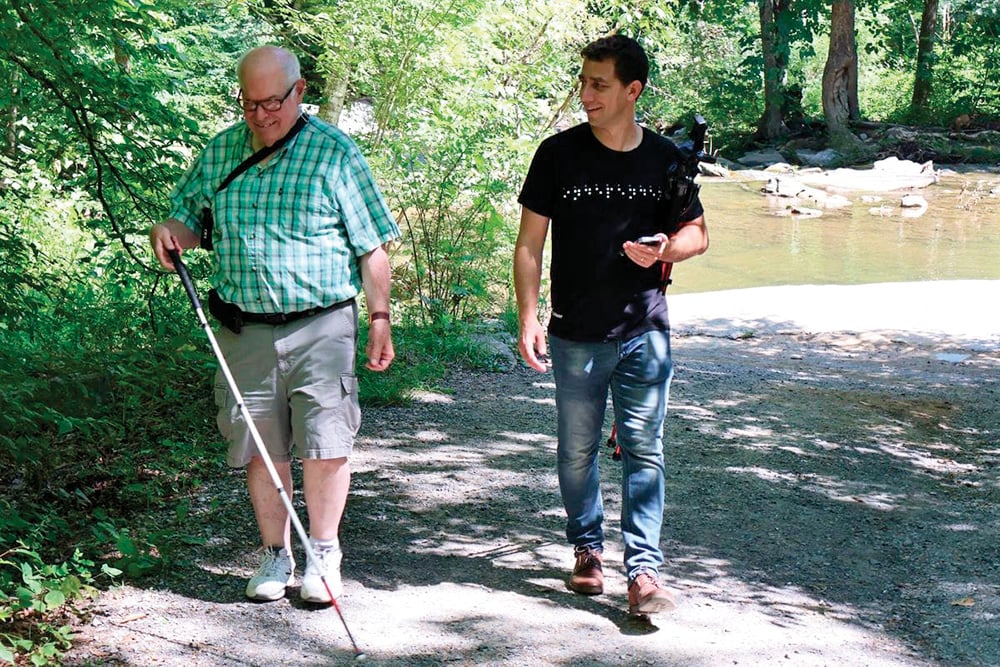RightHear’s solution makes independent navigation easier for people with visual impairment in national parks, malls, supermarkets and more.

The ability to walk independently in nature, in a shopping mall or in any unfamiliar space isn’t a given for people with vision impairment. Award-winning Israeli company RightHear is changing that reality, one venue at a time.
Tens of thousands of people are finding their way to and around more than 2,500 locations that have installed the audio orientation and guiding system so far. These include restaurants, supermarkets, hotels, healthcare facilities, theaters, malls, airports and college campuses in Israel, North America, the United Arab Emirates, Lithuania, Greece and Angola.
In August, Natural Bridge State Park in Virginia became the first U.S. state park to offer the digital accessibility solution.
“We believe that everyone should have equal access to the park. With the installation of RightHear, we are taking a significant stride toward creating an inclusive environment where all guests, including those who are blind or have low vision, can enjoy their visit,” said Park Manager Jim Jones.
RightHear, founded in 2015, is headquartered in central Israel with an office in Maryland.
“RightHear started due to my own orientation challenges. Realizing how challenging orientation is for people who are blind or visually impaired has driven us to find a better way of making everyone’s life much easier and independent,” said RightHear founder and CEO Idan Meir. “In a world where you can have pizza delivered by a drone, we sometimes forget the real human challenges out there.”
As of Sept. 1, RightHear started to be integrated into San Francisco-based Good2Go’s access-controlled restrooms across America. People with visual disabilities can use the RightHear app to unlock the restrooms via smartphone and navigate the space independently through audio cues and directions.
RightHear’s system is composed of beacons (accessibility spots) installed onsite, using Bluetooth to detect when a user is nearby; a free anonymous iOS or Android user app; and a cloud-based dashboard where the company and the facility control, add and manage the text-to-speech descriptions.
“It supports 26 languages. This is super important because aside from our core consumer with visual disabilities, it also helps people with cognitive disabilities and orientation challenges, or people traveling in a foreign country who don’t know the language,” Meir said.
In the app, the user chooses a RightHear-enabled location from an audible menu. The app suggests additional info about the location, including a simulation to help the user build a mental map of the place beforehand, “and most importantly, the confidence to actually go there independently,” he added.
Using GPS, the app works outdoors to help users navigate to the location; it can order a Lyft or Uber or provide auditory step-by-step directions. A live assistant feature enables users to request more information or guidance.
“Once you reach the location, the app does three main things: tells you where you are; what you will find there, with opening hours and points of interest; and what is around you and at what distance. There are a lot of other features, but that’s the core,” said Meir.
“We will soon launch a new technology we’ve been working on for the past two years, based on computer vision with other technologies such as AI to enable more accurate positioning so users know exactly where they are in relation to other objects,” he continued. “It will open new markets for us outside of way-finding.”
RightHear discovered that simply offering its product to venues isn’t effective because most venue managers don’t realize they have an accessibility problem unless customers have made them aware of it. The company therefore started a weekly accessibility meetup, a community of people who are blind or visually impaired to discuss accessibility challenges.
“We empowered this community to reach out to facilities and tell them they have a problem and need a solution,” Meir explained. “The project with Natural Bridge State Park is the result of a person who wrote an email to the park’s management explaining that he likes visiting in the area but has difficulty accessing the park. And then they reached out to us.”
Meir said that although the Americans with Disabilities Act mandates Braille signage in many locations, over 90% of the blind community cannot read Braille. “And those who can read Braille have a hard time finding those signs. On top of that, people are wary of touching public signs since the pandemic. So nobody’s really using them,” he said.
“An audio form of signage was inevitable; the technology exists and awareness has been building up. The more locations that join what we are doing, the more facilities that make their space accessible, the more awareness we have.”








